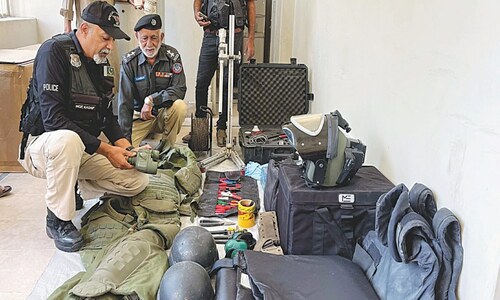 KARACHI, June 29: The government’s policies regarding Afghanistan and Kashmir, the formulation of policies without the sanction of the Parliament and the military operation in Muhmand Agency, were bitterly criticized and termed impediments to normalization of Pakistan’s relations with its neighbours by a conference which focused mainly on the plight of Afghan refugees.
KARACHI, June 29: The government’s policies regarding Afghanistan and Kashmir, the formulation of policies without the sanction of the Parliament and the military operation in Muhmand Agency, were bitterly criticized and termed impediments to normalization of Pakistan’s relations with its neighbours by a conference which focused mainly on the plight of Afghan refugees.
The conference was organized by the Afghanistan-Pakistan People’s Friendship Association, in collaboration with the Human Rights Commission of Pakistan on Sunday.
Initiating the debate, chairperson HRCP Afrasiab Khattak said that as long as the state did not renounce the ‘jihadi paradigm’ Pakistan’s relations with its neighbours would not be friendly and enduring.
Mr Khattak did not find any difference between the policies of Gen Musharraf and religious fundamentalists vis-a-vis Afghanistan and Kashmir. Stressing the need for a change, he claimed that owing to wrong policies of undemocratic and un-elected governments in Pakistan and the fallout of the Afghan war, relations between the people of the two countries had not been raised to the level of their full potential.
He alleged that during the past three or four years police excesses against Afghan refugees had increased. He urged corrective measures in that regard. Referring to tension on the Pak-Afghan border, Mr Khattak said that the Pakistan army’s operation in the Muhmand Agency was wrong. He said if there was any problem with the border posts, the matter could have been resolved through mutual dialogue. He demanded that a white paper on the agencies role in Afghanistan be published.
The conference unanimously called upon the world community to fulfil its pledges for the reconstruction and rehabilitation of Afghanistan’s fragile economy and state which would create appropriate grounds for sustainable repatriation of Afghan refuges from different parts of the world, especially from Pakistan.
It was said that complete repatriation of Afghan refugees depended on the fulfilment of the pledges made by international community during the Tokyo conference, which would ultimately bring prosperity to the country in the shape of more jobs and a boost to business activities.
The conference also called upon Pakistani authorities to check the high-handedness of the law enforcement agencies against vulnerable Afghan prisoners who were behind bars for petty offences or under the Foreign Act.
The participants also emphasized the need for cooperation between the civil societies of Pakistan and Afghanistan and links between intellectuals of the two countries.
They also agreed that a free-trade zone in the tribal areas would positively affect business activities of both the countries and would attract international business community to this region for investments.
Mr Yusuf Masti Khan, Mr Iqbal Haider, Qazi Nangyali Saddiqui (an Afghan refugee) and many others also spoke.
Muhmand Agency was wrong. He said if there was any problem with the border posts, the matter could have been resolved through mutual dialogue. He demanded that a white paper on the agencies role in Afghanistan be published.
The conference unanimously called upon the world community to fulfil its pledges for the reconstruction and rehabilitation of Afghanistan’s fragile economy and state which would create appropriate grounds for sustainable repatriation of Afghan refuges from different parts of the world, especially from Pakistan.
It was said that complete repatriation of Afghan refugees depended on the fulfilment of the pledges made by international community during the Tokyo conference, which would ultimately bring prosperity to the country in the shape of more jobs and a boost to business activities.
The conference also called upon Pakistani authorities to check the high-handedness of the law enforcement agencies against vulnerable Afghan prisoners who were behind bars for petty offences or under the Foreign Act.
The participants also emphasized the need for cooperation between the civil societies of Pakistan and Afghanistan and links between intellectuals of the two countries.
They also agreed that a free-trade zone in the tribal areas would positively affect business activities of both the countries and would attract international business community to this region for investments.
Mr Yusuf Masti Khan, Mr Iqbal Haider, Qazi Nangyali Saddiqui (an Afghan refugee) and many others also spoke.














































Dear visitor, the comments section is undergoing an overhaul and will return soon.